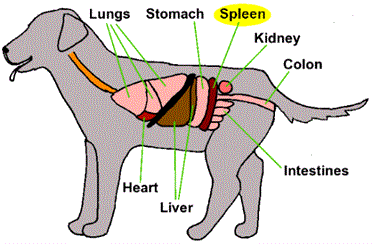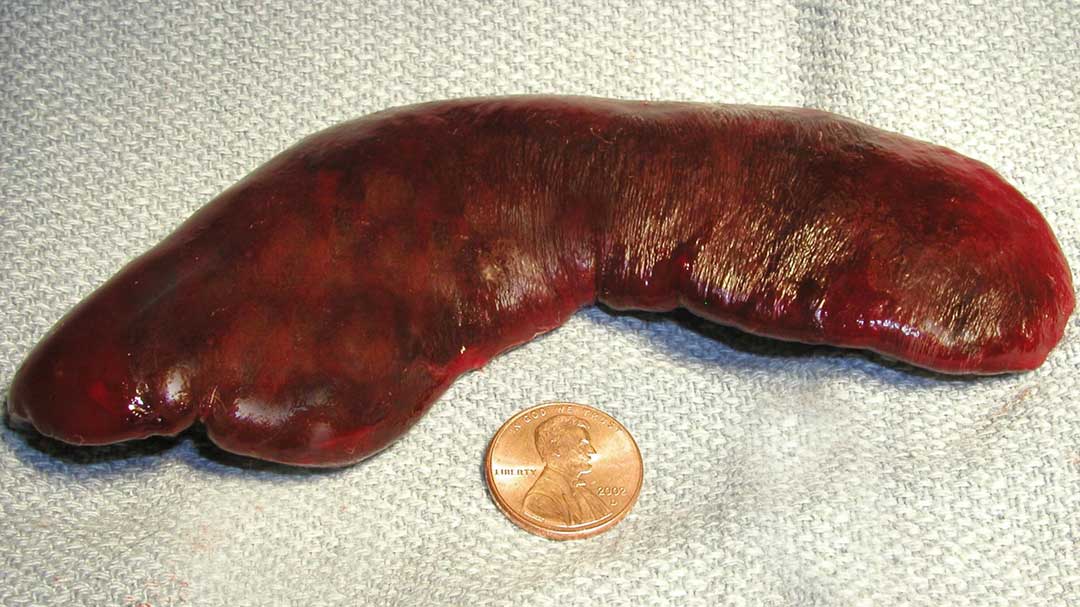
While there are treatments and methods for achieving. My dog was diagnosed with a tumor on his spleen and had internal bleeding.

In dogs most splenic tumors are either hemangiomas or hemangiosarcomas.
How long can a dog live with a tumor on the spleen. The life expectancy of dogs with spleen tumors varies and is mostly based on several important factors such as the type of spleen tumor that is present and the dogs age. While an exact life expectancy cannot be determined due to many individual factors by looking at some past studies and research it is possible for some rough estimations to be drawn. With spleen cancer in dogs life expectancy is unfortunately often very short - from a few days to a few months.
A lot depends on the severity and spread of the cancer. Spleen cancer in dogs tends to be very aggressive - it grows fast and also has a high possibility of metastasizing spreading to other parts of the body. With a healthier immune system your dog can fight cancer Either way my dog wont live longer than 6 months No matter which choice I made my dog would not survive long.
Even with surgery and treatment Lucky would not live another 6 months. In some cases in order to prolong your dogs life a tumor on the spleen may be removed along with the surrounding tissue which may include the entire spleen. If this surgical treatment is possible it alone can extend your dogs life for two to three months.
Patients with benign tumors of the spleen typically live normal lives and suffer no ill effects from having had their spleen removed. Patients with hemangiosarcoma have an average survival time of 3 months post surgery with a range of a few weeks to a little more than a year. If the patient has a malignant tumor of the spleen surgery will typically extend the life of the patient for two to three months.
There are various follow-up chemotherapy protocols with varying resulting survival times ranging from 140 to 202 days. For more information on this subject speak to the veterinarian who is treating your pet. Unfortunately the overall prognosis is not good for dogs with spleen tumors even when combined splenectomy and chemotherapy are.
Unfortunately survival times despite surgical and chemo treatment remain rather short generally no more than 6 months. Dogs who have a tumor of the spleen without rupture generally have a better prognosis compared to a splenic tumor that has ruptured according to the Flat-Coated Retriever Society of America Inc. My dog was diagnosed with a tumor on his spleen and had internal bleeding.
We opted to take him home instead of putting him down. We have given him the yunan Baiyao herb to help with the bleeding. After a couple of weeks he is back to normal.
While some pet parents discover a dogs cancer during a drastic decline in their health others may discover the issue during a routine exam of their happy pup. Some dogs will have a short span of happy days after their cancer diagnosis. For malignant tumors they can either be hemangiosarcomas which grow from the red pulp or mast cell tumors and lymphosarcoma that grow from the white pulp.
In dogs most splenic tumors are either hemangiomas or hemangiosarcomas. Hemangiosarcoma represents about 45-51 of canine spleen cancer. Canine Hemangiosarcoma Splenic Tumors.
If possible the tumor will be removed along with the surrounding tissue or the entire organ A successful splenectomy may give your dog an additional three months of life. If chemotherapy can be successfully employed along with surgery survival time may be lengthened but not considerably. The life expectancy of a dog with an aggressive tumor that has spread to other parts of the body mediatized is roughly 4 to 6 months.
Assuming the mast cell is in a place where it can be completely removed through surgery including a wide margin to account for cancer cells not seen there is a 90 100 chance the tumor will not recur. The most common problem in dogs that results in removal of the spleen is a tumor. Splenic tumors are often cavitated meaning they have fluid blood in the center and can grow quite large.
These tumors are at risk for rupture and leakage of blood into the abdomen. Tumors on the spleen can be benign or cancerous. If a tumor is found on the spleen but is not yet bleeding into the abdomen the chance of the tumor.
As alluded to above three retrospective studies found that dogs with non-traumatic hemoperitoneum 15 and with hemoperitoneum due specifically to splenic masses 3 had a greater prevalence of hemangiosarcoma 633-704 when compared to dogs in large-scale retrospective studies which included all splenic samples whether associated with hemoperitoneum or not. Prevalence less than 25. 67 In the JAVMA study evaluating dogs with splenic.
If you hear it combined with the word spleen you may wonder what it means because the spleen is an organ that doesnt get a lot of attention. Despite its importance your dog can live without his spleen meaning a splenectomy is the treatment of choice for a dog with a spleen tumor. The prognosis depends on the type of tumor.
If you were to look at some of the other statistics above you can see that if you had a dog who underwent spleen removal 8 weeks ago is not on chemo and is still maintaining you are beating the odds. This is very very good news. This is successful treatment.
Without chemotherapy your dogs spleen cancer prognosis will be very poor indeed. You may expect your dog to survive for two weeks to two months after spleen removal. If your dog receives chemotherapy after spleen removal he may live for up to six months after diagnosis.
With pets living longer than ever cancer has become a diagnosis that we see more commonly in older dogs. The American Veterinary Medical Association AVMA reports that one in four dogs will develop cancer at some time in their life and that 50 of pets over the age of 10 will develop cancer. While there are treatments and methods for achieving.